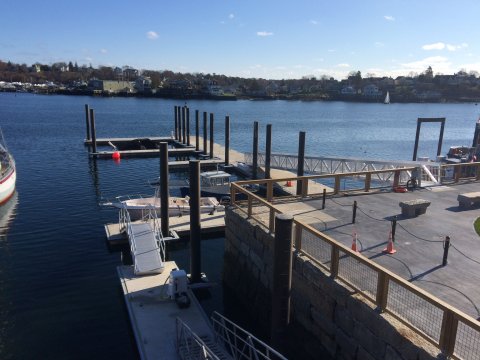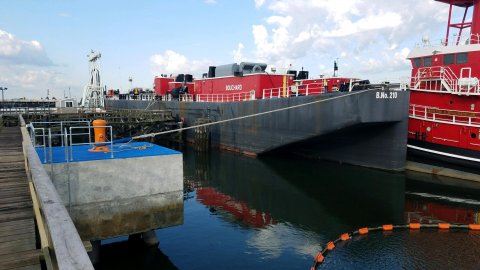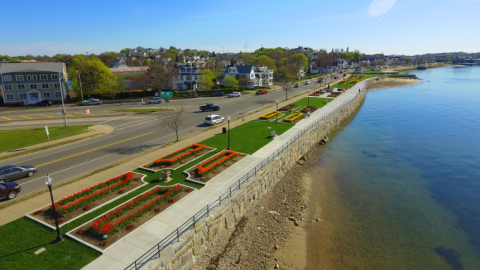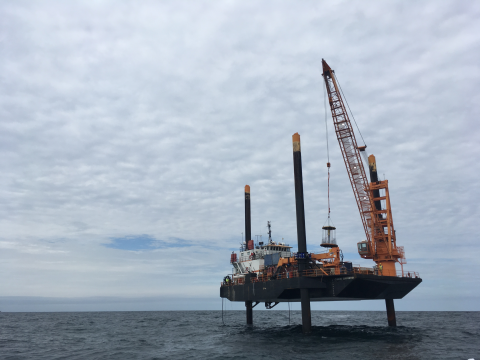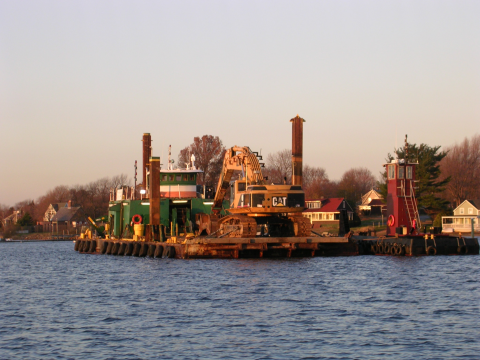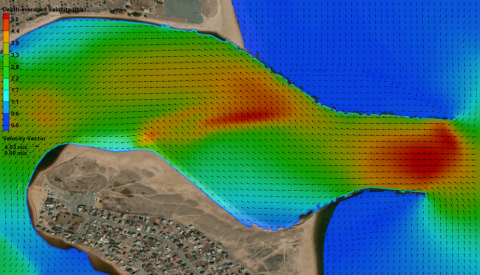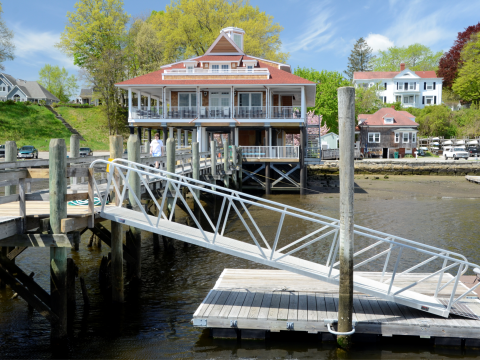GZA’s Waterfront and Coastal practice began in the 1980s and has since grown to include comprehensive, turnkey coastal and waterfront engineering planning, engineering and design services. GZA was part of the engineering and design team for the first offshore wind turbines and the first offshore wind port constructed in the United States.
GZA’s waterfront and coastal engineering staff is diversified, including planners, landscape architects, ocean and coastal engineers, civil, geotechnical and structural engineers, oceanographers, meteorologists, ecologists and natural resource specialists, and hydrographers.
GZA’s engineering and applied science experience can be brought into our waterfront and coastal projects if specialized project issues arise. We navigate the complex regulations that apply to waterfront and coastal projects and coastal structural engineering while leveraging our permitting experience to control cost and limit project schedule impacts.
GZA provides comprehensive planning, design, and construction services to assist in the construction, rebuilding, maintenance, and protection of current and future harbors for smaller craft, including facility component design (e.g., piers, floats, wave attenuators, etc.).
- Harbor and Marina Siting and Planning
- Environmental Load Determination
- Hydrographic and Topographic Survey
- Coastal Resilience Planning, Engineering and Design
- Structure Condition Surveys
- Coastal Structural Engineering
- Clean Marina Planning and Design
- Pump-Out Facilities
- Boat Haul and Launch Structures
- Maintenance Dredging
- Construction Management and QA Services
- Permitting and Regulatory Compliance
The increasing demand for commercial shipping and port access, larger vessel size and the deterioration of existing structures present port siting, engineering and design challenges. The offshore wind market and other emerging marine initiatives are creating a demand to retrofit existing ports to support those industries’ specific needs.
GZA supports port and terminal owners and their port planning and design consultants by providing specialized expertise in the design and construction of marine structures including mooring and berthing systems, piers and wharves, marine bulkheads, revetments, breakwaters, dry docks and crane foundation systems, and other coastal structural engineering.
- Environmental Load Determination
- Hydrographic and Topographic Survey
- Coastal Resilience Planning, Engineering and Design
- Site and Subsurface Investigations
- Structure Condition Surveys, including Destructive and Non-Destructive Testing
- Geotechnical Earthquake Engineering, including Seismic Site Response and Liquefaction
- Numerical Modeling and Soil-Structure Interaction (SSI)
- Facility Structures Design
- Vessel Mooring Analysis and Design
- Construction Management and QA Services
- Permitting and Regulatory Compliance
High wave energy coastal environments utilize foreshore structures such as seawalls, flood walls and revetments for flood and shoreline protection of developed areas.
GZA provides comprehensive inspection, engineering and design services for the repair and/or new construction of all foreshore structures and associated improvements. Our design process begins with the characterization of environmental loads, including analysis of water level and wave frequency data, to establish structure performance requirements. GZA’s designers and engineers include civil, geotechnical and structural engineers and landscape architects, providing complete design services, preparation of construction documents and project permitting.
- Site Investigations and Survey
- Structure Condition Surveys
- Environmental Load Determination
- Engineering and Design
- Permitting
- Construction Oversight
The design of nearshore and offshore structure foundation systems, pipelines and transmission cables requires specialized geotechnical engineering expertise in the marine environment.
GZA has a core group of ocean and geotechnical engineers and scientists with specialized marine geomechanics expertise and established relationships with deepwater drillers, marine geophysical surveyors and key ocean engineering academic and research institutions.
- Offshore Geotechnical and Geophysical Program Design and Implementation
- Bathymetric and Sub-Bottom Survey
- Environmental and Physical Sediment Testing
- Geotechnical Data and Design Reports
- Geotechnical Earthquake Engineering, including Seismic Site Response and Liquefaction
- Numerical Modeling and Soil-Structure Interaction (SSI)
- Submarine Slope Stability
- Underwater Pipeline and Cable Installation
- Geotechnical Failure Risk Analysis
The dredging and management of sediment, in particular contaminated sediment, presents unique and potentially expensive project challenges.
GZA provides comprehensive planning, investigation, engineering, design and beneficial reuse services for marine dredging projects.
- Dredge Feasibility Studies and Planning
- Bathymetric and Sub-Bottom Survey
- Environmental and Physical Sediment Sampling and Testing
- Profile Development and Dredge Volume Calculation
- Dredge Design
- Disposal Siting and Alternatives Analysis
- Environmental Impact Analyses (EIAs)
- Permitting and Regulatory Compliance
Local, comprehensive beach management plans are an effective tool for managing natural resources for recreational, environmental and commercial use in accordance with regulations and local and state goals.
GZA supports communities, beach associations and state agencies with the development and implementation of beach management plans, helping them to preserve and maintain local resources and community and commercial spaces.
- Beach Topographic survey and dune profiling
- Longshore and Cross-Shore Erosion and Sediment Transport Analyses
- Best Management Practices
- Beach Nourishment, including Sediment Source Identification and Feasibility Analysis
- Dune Maintenance and Repair
- Post-Disaster Recovery
- Permitting and Regulatory Compliance
Beaches, bluffs, estuaries and marshes are dynamic features that naturally respond to the effects of water level, waves and currents. Although naturally dynamic, alteration of these features can result in increased coastal flood risk, loss of wetland and coastal habitat and loss of recreational resources. These features also frequently form the boundary between the natural and built environment.
GZA’s coastal engineering, ecology and geomorphology experts utilize a risk-based, “engineering with nature”, maximizes the use of sustainable, natural and nature-based features and utilizes traditional hard and hybrid structures such as seawalls, revetments, breakwaters, sills, jetties, groins and reinforced dunes where appropriate.
- Living Shoreline Design and Construction
- Beach Nourishment
- Bluff and Dune Stabilization
- Wetland Construction and Restoration
- Estuary Management including Tide Gate and Channel Design
- Wave Attenuation
- Permitting and Regulatory Compliance
The accurate characterization of environmental conditions is the foundation of all waterfront and coastal projects. The environmental conditions, and their effects, directly influence project decisions, design and understanding of risk.
We provide comprehensive metocean data analysis including statistical analyses of wind, water levels, waves and currents. GZA performs comprehensive numerical modeling of wind-generated waves, tides, storm surge, tsunamis and seiches and has completed grid and model development for most of the Gulf of Mexico and western Atlantic seaboards and several of the Great Lakes. GZA utilizes Geospatial Information Management (GIS) technology to facilitate our data analysis and to more effectively communicate the results of our analyses to stakeholders.
- Statistical Analysis of Wind, Water Level, Waves and Currents, including Extreme Value Analyses
- Numerical Hydrodynamic Modeling of Oceans, Estuaries and Rivers including Tidal Circulation, River Hydrology and Hydraulics and Overland Flow
- Numerical and Analytical Wave Modeling
- Numerical, Empirical and Analytical Modeling of Longshore and Cross-Shore Sediment Transport
- Coupled Stormwater, Overland Flow, Groundwater, Storm Surge Hydrodynamic and Infrastructure Hydraulic Modeling
- Scour Analysis
- Contaminant Transport Modeling
Coastal communities are increasingly vulnerable to the effects of coastal flooding, climate change and sea level rise. This vulnerability can affect the social, environmental and economic sustainability of the community.
GZA provides comprehensive coastal resilience and climate adaptation planning and design services to assess and mitigate those risks as clients develop coastal zone management plans.
- Coastal Flood Hazard Vulnerability Assessment
- Natural Hazard Mitigation Plans
- Coastal Resilience and Climate Adaptation Plans
- Emergency Response Plans
- Resilience Feature Design including Seawalls, Floodwalls and Natural and Nature-based Features
- Stormwater Infrastructure Engineering and Design
- Plan Implementation Consulting and Training
- Financial and Cost Recovery Planning
- Grant Application Preparation
Long Wharf Flood Protection Study and Living Shoreline Design
Seaside State Park Master Plan Environmental Impact Evaluation
Blog
Two Grants for Environmental, Coastal, and Climate Resilience in New Hampshire Estuaries Now Accepting Applications
Seabrook-Hamptons Estuary Alliance Estuary Management Small Grants Program Applications due: October 15th Total Award: $5,000 to $25,000 per round. Eligible Entities: Municipalities, nonprofits...
Blog
Optimizing Nourishment Strategies: A Multi-Model Approach for a Massachusetts Barrier Beach
Marsh barrier beaches form a line of defense against storm surges and sea level rise for coastal communities. Along the Massachusetts coastline near Boston, USA, there are several beaches composed of...
Blog
Poster: ProvPort Master Plan
ProvPort, Inc. operates the Port of Providence in Rhode Island, which is one of only two deep-water ports in New England, one of five active ports in Rhode Island, and one of the busiest deep-water...
Article
Creating a Resilient Marina
In the July/August 2025 issue of Marina Dock Age, Dan Stapleton, Matt Page, Jeff Taylor, and Wayne Cobleigh are the coauthors of “ Creating a Resilient Marina.” In this article, the authors explore...
Tell us about your project.

